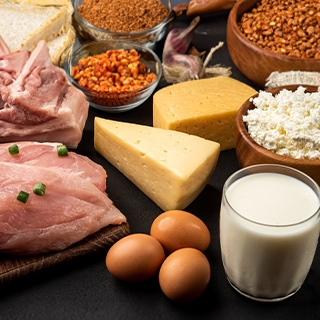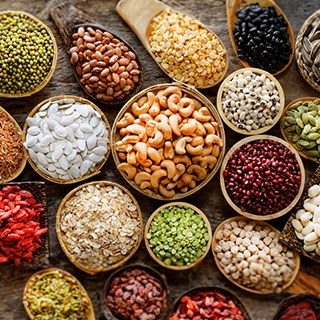Are you tired of feeling bloated, gassy, or uncomfortable after meals? It might surprise you to learn that the key to digestive comfort and your overall gut health could lie in your protein intake. A summary from our previous topic on "7 Reasons Why Protein Is Important" highlights that protein isn't just essential for muscle building and repair — it's crucial for a healthy digestive system even more.
Get ready to discover what role this macronutrient, protein, plays in boosting your digestive health in this article!

Protein digestion takes longer than carbohydrates, helping you feel full longer. This extended digestion process means you’re less likely to overeat, which can significantly reduce digestive discomfort such as bloating and gas. By consuming protein-rich foods like chicken, fish, and beans, you can maintain a feeling of fullness that helps control your appetite and promotes healthy weight management.

Protein is essential for repairing and building tissues, including gastrointestinal tissue that is in your digestive system. The gastrointestinal tract plays a vital role in digestion by producing enzymes and hormones that break down food into nutrients, while hormones regulate digestive processes. Ensuring you have enough protein in your diet helps your body efficiently repair and support your digestive tract, keeping it healthy and functional.

Consuming enough protein supports the growth and repair of cells lining your digestive tract. These cells form a barrier that prevents harmful substances from entering your bloodstream and causing inflammation. This barrier is critical in maintaining a healthy gut environment. Foods rich in protein, such as eggs, dairy, and legumes, contribute to the integrity of this barrier, reducing the risk of digestive disorders and promoting overall gut health.

By maintaining the integrity of the digestive tract's lining, protein can help reduce the risk of digestive issues such as leaky gut syndrome. This condition occurs when the lining of the small intestine becomes damaged, allowing undigested food particles and toxins to leak into the bloodstream, resulting in inflammation. Adequate protein intake helps to fortify this lining, thereby preventing such leaks and supporting overall gut health.

A variety of protein sources ensure you get all the essential amino acids needed for optimal digestion. Amino acids are the building blocks of proteins and are crucial for various bodily functions, including the repair and growth of tissues in the digestive tract. Including a diverse range of protein-rich foods like lean meats, poultry, fish, eggs, dairy products, legumes, nuts, and seeds in your diet ensures that you receive a comprehensive mix of essential amino acids necessary for maintaining a healthy digestive system.

Protein helps maintain a healthy weight by keeping you satiated, which is beneficial for overall digestive comfort. A diet high in protein can increase metabolism and promote fat loss while preserving muscle mass. This is particularly advantageous for those looking to manage their weight, as maintaining a healthy weight is directly linked to better digestive health. Incorporating protein into every meal can help you control hunger and reduce calorie intake, leading to more stable digestive processes and fewer digestive issues for better weight management.

In addition to a protein-rich diet, focus on staying hydrated, exercising regularly, managing stress, and getting adequate sleep to support digestive health. Hydration aids in digestion and nutrient absorption, while regular exercise stimulates intestinal activity, promoting regular bowel movements. Stress management is crucial because chronic stress can negatively impact your digestive system. Adequate sleep ensures that your body has the time it needs to repair and regenerate, including your digestive tract. Together, these lifestyle habits complement a protein-rich diet, enhancing overall digestive health and well-being.
Prioritising protein in your diet is a simple yet effective way to boost digestive health. Start incorporating a variety of protein-rich foods and healthy lifestyle habits today to ensure your digestive system functions optimally. To help you fulfil your daily protein intake, consider adding a protein powder such as Nutrilite Soy Protein Drink to your routine. This plant-based protein powder is a convenient and nutritious way to support your digestive health. Your body will thank you!
References: